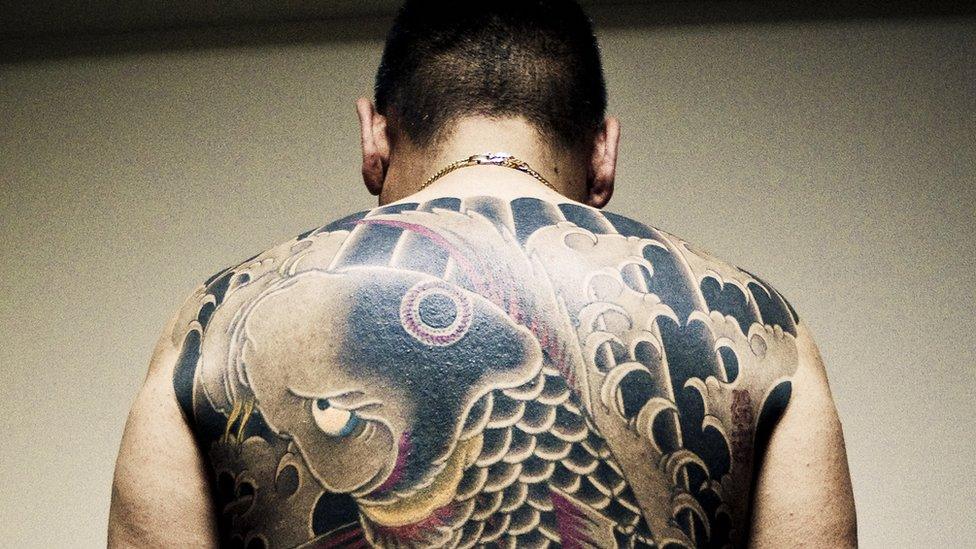Tattoos in Japan: Why they're so tied to the yakuza
- Published

You might think there's no way the elephant tattoo on your ankle could be seen as being linked to criminal gangs - but you'd be wrong.
Fans and players heading to Japan for the Rugby World cup have been urged to cover up their inking to avoid offending some people in the country.
It's because of the association between tattoos and a mafia-like group called the yakuza - which has operated in Japan for hundreds of years.
"Some people see them as a necessary evil and other people see them as just, they should disappear," says Anton Kusters.
He spent two years embedded with the yakuza between 2009 and 2011.
"It was, to say the least, a very interesting experience," the visual artist tells Radio 1 Newsbeat.
Who are the yakuza?
The yakuza are involved in criminal activity such as prostitution, organised gambling and racketeering.
"They grew from this kind of underground movement of street peddlers and gamblers who started uniting themselves and feeling that they were the keepers of the old and the proud Japan," Anton says.
And while they're happy to extort politicians, businessmen and companies, some of the older bosses were "really against" things like drug trafficking.
"They would always have their reasons for doing things a certain way or not doing things a certain way."
The main thing Anton learned during his time with a particular yakuza crime family was that judging the yakuza isn't as black and white as it might seem.
"It's this very grey, murky area where they would do good things, like after the tsunami they would be the first people on the scene helping out.
"But at the same time they would engage in bad things."
He says this is what makes it difficult for the yakuza to be outcast completely in society.
How do tattoos come into it?
"The tattoos are crucial to yakuza members," according to Anton.
But they're not used as markers to signify you're part of a gang, like they are in some places in Central and North America.
They're instead a "very personal depiction" of a scene from the yakuza member's life, or something symbolically important to them - which is meant to show people the attributes that person is known for.
They can cover almost the entire body, from the back down to the buttocks and the top of your legs, as well as the arms - although due to the stigma the tattoos hold in Japanese society, they often cut off before the forearms and the shins.
"My direct contact had a difficult youth and he overcame a big adversity. So he had a tattoo of koi swimming upstream, which signifies a strong will and the power to overcome something. It's that kind of symbolism."
Anton says yakuza members used to meet in communal bath houses mainly because the lack of clothing meant rival gangs meeting each other could figure out who they were dealing with by the artwork on their body.
"The other reason meeting up in bath houses is important is because you see that nobody has a concealed weapon, because you're all naked."
Not just any old yakuza can get a tattoo
"It's actually the tattoo master who's deciding whether that person is good enough to have a tattoo," Anton says.
If the master decides you're worthy, it's a process that can take up to a year to complete in weekly sessions at a cost of around 拢10,000.
That's actually one of the ways yakuza would attract younger members, according to Anton.
"The young kids, who are 17, 16, and very impressionable - the lost youth in Japan hanging around on the streets - would obviously be very allured by the yakuza lifestyle, because they look like smooth criminals in a way.
"Having a tattoo would obviously be high on their wish list. And that would be when the yakuza would say 'OK we will pay for this for you, and you can work it off'.
"And that's the way you get sucked in as a member."
The tattoos take so long to complete and cost so much because Japanese tattoos are still done without electrical equipment, with apprenticeships able to last several decades.
"They use a fine wooden stick with four needles at the top and push them manually, by hand, at about two stabs per second. And they vary the angle depending on the amount of fat in the area of the body.
"They sign their tattoos, but they still sign with the name of their master, so there is this old tradition that keeps on going that way."
'It's about respect'
Anton says the yakuza keep their tattoos covered up in public because they're very aware that tattoos are frowned upon.
"They're the ones who brought upon this frowning, obviously, because they started tattooing themselves."
But he adds that westerners walking around in public with full sleeves won't cause an issue as long as they obey rules in the communal bath houses popular around the country.
"Historically they didn't dare say 'We don't want yakuza having meetings here and chasing away the other customers'. So they would say in a very opaque way 'We don't allow tattoos', because hundreds of years ago only yakuza people had tattoos."
is to wear a T-shirt in pools, as the rugby teams have been doing and the Welsh rugby team says it will do.
"Covering your tattoo and showing to other people in the pool that you understand it could be something offensive - and that you have taken action to cover it - it's showing that you're aware of your surroundings and respecting them," says Anton.
- Published20 September 2019
- Published17 March 2016